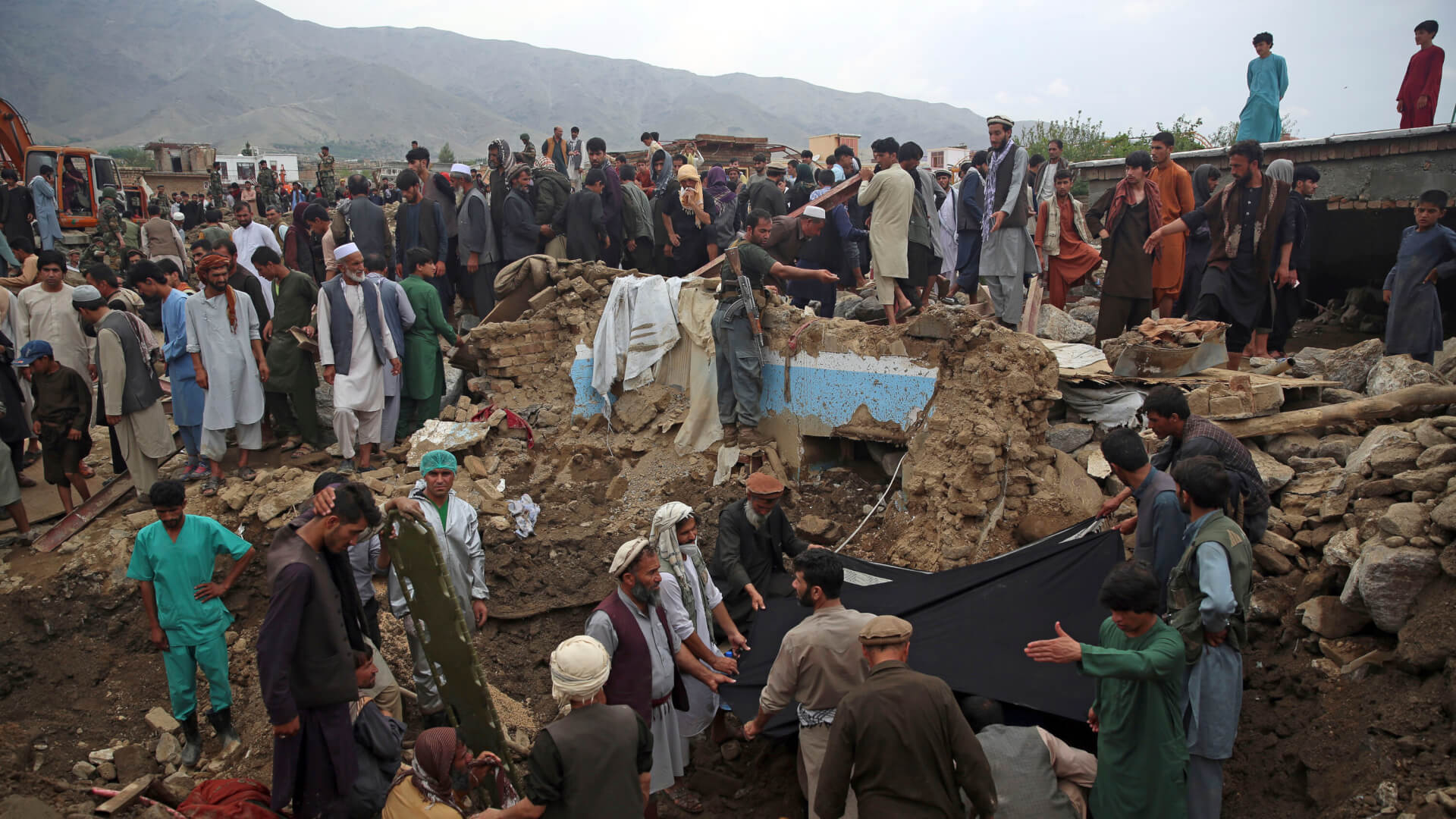Intense flash floods in Afghanistan and Pakistan over the past month have killed at least 180 and 900 people, respectively, leaving thousands of others homeless or injured. The flooding has been attributed to rising sea levels caused by climate change but Afghanistan and Pakistan are also in the middle of their monsoon season, which usually extends from July to September.
Taliban spokesperson Zabihullah Mujahid said, “The Islamic Emirate of Afghanistan can’t manage the floods alone, we ask the world, international organisations and Islamic countries to help us.”
Along the same lines, Deputy Minister of Disaster Management Mawlawi Sharafuddin Muslim said the situation will worsen in the upcoming days unless aid is dispatched to help families “get back to normalcy.”
According to the Taliban’s State Ministry for Disaster Management, thousands of houses and acres of land have been destroyed, with the Logar and Uruzgan provinces particularly hard hit.
On Wednesday, the Afghanistan Meteorological Department issued a flood warning in 24 provinces across the country from August 26 to 27.
Back to back disasters in Afghanistan, based on preliminary information, floods killed 20, around 30 people injured and 4 people are missing in Logar's Khoshi district. It also destroyed about 3,000 houses and killed thousands of animals.#Afganistan #flooding #Logar pic.twitter.com/xN4q7rOlvP
— Khoshhal Taib (@KhoshTaib) August 21, 2022
Ministry spokesperson Mohammad Naseen Haqqani said, “First, we provided essential needs for the flood-affected people. Second, we held meetings with organisations in the capitals and provinces to encourage them to provide assistance.”
However, the ministry highlighted that the government does not have enough funds to rebuild destroyed houses.
Floods have devastated homes in Logar province's Khushi District.
— UNHCR Afghanistan (@UNHCRAfg) August 25, 2022
UNHCR dispatched 202 family tents to support the inter-agency Afghanistan flood response in Pul-e-Alam.#StayAndDeliver pic.twitter.com/paYnSqlIbz
Keeping this in mind, the Organisation of Islamic Cooperation (OIC) called on members to support relief operations in Afghanistan.
Likewise, the spokesperson for the Secretary-General of the United Nations, Stéphane Dujarric, said the organisation would provide humanitarian aid and assistance to the 8,200 families affected by the flash floods.
Just across the border, Pakistan, too, is facing unprecedented rains and flash floods. The Pakistani government declared a “national emergency,” calling the heavy rainfall a “climate-induced humanitarian crisis of epic proportions.”
There should only be one singular focus in Pakistan right now: that is the resourcing,coordination & provision of relief to millions stranded by the #monstermonsoons hitting Pakistan in a cascade of catastrophic cycles.Latest cumulative figures show Sindh hit highest at 784 % 1/2 pic.twitter.com/tmFfLHpe8F
— SenatorSherryRehman (@sherryrehman) August 25, 2022
The National Disaster Management Authority said the Sindh province is the worst affected, with 306 deaths since June 14. Twenty-three districts in Sindh have been declared as “calamity-hit.”
Meanwhile, Balochistan, Khyber Pakhtunkhwa, and Punjab have respectively reported 234, 185, and 165 deaths. 46 people have also died in Pakistan-Occupied-Kashmir and Gilgit-Baltistan.
Minister for Climate Change Sherry Rehman announced the establishment of a “war room” but said the “monstrous” rains have made it “hard to carry out relief operations, especially helicopter sorties.”
She also noted that the country is facing its eighth monsoon cycle this season, compared to an average of two or three in other years.
Rehman called for international aid to combat the “unprecedented humanitarian crisis,” saying the federal and provincial governments cannot handle the situation on their own.
PM chaired International Partners meet for cooperation in flood rescue,relief& rehabilitation right after reaching Isd at EAD.
— Marriyum Aurangzeb (@Marriyum_A) August 25, 2022
Chairing a flood relief& rescue cash distribution updates as I am writing this tweet.Chairman NDMA&provinces giving briefing & PM going to Sukhar Tom IA https://t.co/O2yIIicApe pic.twitter.com/UTAzNwDWKp
Finance Minister Miftah Ismail highlighted the need for Pakistan’s development partners to step in and dispatch “broad-based support and assistance” to the victims.
To this end, Prime Minister Shehbaz Sharif convened discussions with ambassadors, high commissioners, and other senior diplomatic officials in Islamabad to “sensitise them about the scale of human tragedy.”
Meanwhile, Information Minister Marriyum Aurangzeb called on overseas Pakistanis to “donate generously” and evoke their “national spirit” to help the country. To this end, the government has set up a Prime Minister Flood Relief Account to accept donations.
As part of efforts to mobilize all resources, I met Islamabad-based ambassadors, high commissioners & senior members of diplomatic corps today to sensitize them about scale of human tragedy. EAD & NDMA briefed the meeting about the current status of the challenge & response.
— Shehbaz Sharif (@CMShehbaz) August 26, 2022
Rains in Pakistan have reportedly killed 937 people so far, including 343 children, and have rendered 30 million homeless. Pakistan has recorded 166.8 millimetres of rain this month, 241% higher than the average.
According to the government’s assessment report, authorities need $330 million to provide relief to flood-hit areas. This includes $3.4 million for food and instant cash handouts, $109 million for non-food items, and $7.2 million for healthcare equipment and services.
Several international organisations have already released funds to help contain the crisis. The World Food Programme and the Asian Development Bank have provided Pakistan with $110 million and $20 million, respectively. The European Union and the United Kingdom have also released aid for Afghanistan.

